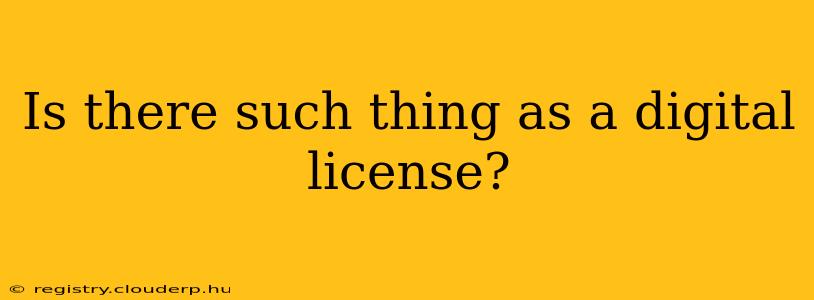Is There Such a Thing as a Digital License? Yes, and Here's What You Need to Know
Yes, absolutely! A digital license is a legally binding agreement that grants you the right to use software, digital content, or other digital assets. It's crucial to understand that it doesn't grant you ownership of the item itself, but rather permission to use it under specific terms and conditions. Think of it like renting a movie – you can watch it, but you don't own the physical copy.
Digital licenses are increasingly common in our digital age, governing everything from the apps on your smartphone to the music you stream. Let's delve deeper into the nuances of this important legal concept.
What Does a Digital License Typically Grant?
A digital license outlines the permitted uses of the digital asset. This can include:
- Installation: The number of devices or computers where you can install the software.
- Access: How many people can simultaneously access the content (e.g., a single-user license vs. a multi-user license).
- Duration: The period for which the license is valid (e.g., a perpetual license versus a subscription).
- Geographic Restrictions: The location(s) where you can use the licensed product.
- Copying & Distribution: Restrictions on copying or sharing the software or content.
- Modifications: Whether you are permitted to modify the software or content.
These terms vary considerably depending on the license agreement. Always read the End-User License Agreement (EULA) carefully before purchasing or using any digital product.
What's the Difference Between a Digital License and Ownership?
This is a critical distinction. When you purchase a digital license, you're not buying the underlying intellectual property rights. You're essentially purchasing a license to use the product under the terms and conditions outlined in the license agreement. The copyright and ownership remain with the creator or owner of the digital asset.
What Happens if I Violate the Terms of a Digital License?
Violating the terms of a digital license can have serious consequences, ranging from warnings and termination of the license to legal action, including substantial fines. Common violations include:
- Installing the software on more devices than permitted.
- Sharing the software or content with unauthorized users.
- Using the software or content in a way not specified in the license agreement.
What are the Different Types of Digital Licenses?
There are many types of digital licenses, each with its unique terms and conditions. Some common examples include:
- Perpetual Licenses: These grant you permanent use of the software, but may still have restrictions on copying, distribution, or modification.
- Subscription Licenses: These grant you access to the software or content for a specific period, typically renewed periodically through payment of a subscription fee.
- Freeware Licenses: These allow free use of the software, often with restrictions on commercial use or modification.
- Open-Source Licenses: These grant you the right to use, modify, and distribute the software under specific conditions, often requiring attribution to the original author.
How Can I Ensure I'm Using Digital Licenses Legally?
- Read the EULA carefully before agreeing to it.
- Only download software and content from reputable sources.
- Keep track of your licenses and ensure you comply with all terms and conditions.
- Consult a legal professional if you are unsure about any aspect of a digital license.
Understanding digital licenses is crucial in today's digital world. By understanding the terms and conditions, you can protect yourself from legal issues and ensure you're using digital products legally and responsibly. Always remember: reading the fine print can save you significant time, money, and potential legal trouble.

